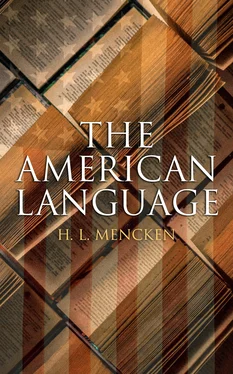1 ...6 7 8 10 11 12 ...21 Elwyn, in 1859, attempted no classification. 59He confined his glossary to archaic English words surviving in America, and sought only to prove that they had come down "from our remotest ancestry" and were thus undeserving of the reviling lavished upon them by English critics. Schele de Vere, in 1872, followed Bartlett, and devoted himself largely to words borrowed from the Indian dialects, and from the French, Spanish and Dutch. But Farmer, in 1889, 60ventured upon a new classification, prefacing it with the following definition:
An Americanism may be defined as a word or phrase, old or new, employed by general or respectable usage in America in a way not sanctioned by the best standards of the English language. As a matter of fact, however, the term has come to possess a wider meaning, and it is now applied not only to words and phrases which can be so described, but also to the new and legitimately born words adapted to the general needs and usages, to the survivals of an older form of English than that now current in the mother country, and to the racy, pungent vernacular of Western life.
He then proceeded to classify his materials thus:
1 Words and phrases of purely American derivation, embracing words originating in:Indian and aboriginal life.Pioneer and frontier life.The church.Politics.Trades of all kinds.Travel, afloat and ashore.
2 Words brought by colonists, including:The German element.The French.The Spanish.The Dutch.The negro.The Chinese.
3 Names of American things, embracing:Natural products.Manufactured articles.
4 Perverted English words.
5 Obsolete English words still in good use in America.
6 English words, American by inflection and modification.
7 Odd and ignorant popular phrases, proverbs, vulgarisms, and colloquialisms, cant and slang.
8 Individualisms.
9 Doubtful and miscellaneous.
Clapin, in 1902, 61reduced these categories to four:
1 Genuine English words, obsolete or provincial in England, and universally used in the United States.
2 English words conveying, in the United States, a different meaning from that attached to them in England.
3 Words introduced from other languages than the English:—French, Dutch, Spanish, German, Indian, etc.
4 Americanisms proper, i. e., words coined in the country, either representing some new idea or peculiar product.
Thornton, in 1912, substituted the following:
1 Forms of speech now obsolete or provincial in England, which survive in the United States, such as allow, bureau, fall, gotten, guess, likely, professor, shoat.
2 Words and phrases of distinctly American origin, such as belittle, lengthy, lightning-rod, to darken one's doors, to bark up the wrong tree, to come out at the little end of the horn, blind tiger, cold snap, gay Quaker, gone coon, long sauce, pay dirt, small potatoes, some pumpkins.
3 Nouns which indicate quadrupeds, birds, trees, articles of food, etc., that are distinctively American, such as ground-hog, hang-bird, hominy, live-oak, locust, opossum, persimmon, pone, succotash, wampum, wigwam.
4 Names of persons and classes of persons, and of places, such as Buckeye, Cracker, Greaser, Hoosier, Old Bullion, Old Hickory, the Little Giant, Dixie, Gotham, the Bay State, the Monumental City.
5 Words which have assumed a new meaning, such as card, clever, fork, help, penny, plunder, raise, rock, sack, ticket, windfall.
In addition, Thornton added a provisional class of "words and phrases of which I have found earlier examples in American than in English writers; ... with the caveat that further research may reverse the claim"—a class offering specimens in alarmist , capitalize , eruptiveness , horse of another colour ( sic! ), the jig's up , nameable , omnibus bill , propaganda and whitewash .
No more than a brief glance at these classifications is needed to show that they hamper the inquiry by limiting its scope—not so much, to be sure, as the ridiculous limitations of White and Lounsbury, but still very seriously. They meet the ends of purely descriptive lexicography, but largely leave out of account some of the most salient characters of a living language, for example, pronunciation and idiom. Only Bartlett and Farmer establish a separate category of Americanisms produced by changes in pronunciation, though even Thornton, of course, is obliged to take notice of such forms as bust and bile . None of them, however, goes into the matter at any length, nor even into the matter of etymology. Bartlett's etymologies are scanty and often inaccurate; Schele de Vere's are sometimes quite fanciful; Thornton offers scarcely any at all. The best of these collections of Americanisms, and by long odds, is Thornton's. It presents an enormous mass of quotations, and they are all very carefully dated, and it corrects most of the more obvious errors in the work of earlier inquirers. But its very dependence upon quotations limits it chiefly to the written language, and so the enormously richer materials of the spoken language are passed over, and particularly the materials evolved during the past twenty years. One searches the two fat volumes in vain for such highly characteristic forms as would of , near-accident , and buttinski , the use of sure as an adverb, and the employment of well as a sort of general equivalent of the German also .
These grammatical and syntactical tendencies are beyond the scope of Thornton's investigation, but it is plain that they must be prime concerns of any future student who essays to get at the inner spirit of the language. Its difference from standard English is not merely a difference in vocabulary, to be disposed of in an alphabetical list; it is, above all, a difference in pronunciation, in intonation, in conjugation and declension, in metaphor and idiom, in the whole fashion of using words. A page from one of Ring W. Lardner's baseball stories contains few words that are not in the English vocabulary, and yet the thoroughly American color of it cannot fail to escape anyone who actually listens to the tongue spoken around him. Some of the elements which enter into that color will be considered in the following pages. The American vocabulary, of course, must be given first attention, for in it the earliest American divergences are embalmed and it tends to grow richer and freer year after year, but attention will also be paid to materials and ways of speech that are less obvious, and in particular to certain definite tendencies of the grammar of spoken American, hitherto wholly neglected.
1.Pp. 22-23.
2.America's Coming of Age; New York, 1915, p. 15. See also the preface to Every-Day English, by Richard Grant White; Boston, 1881, p. xviii.
3.The common notion that the Académie combats changes is quite erroneous. In the preface to the first edition of its dictionary (1694) it disclaimed any purpose "to make new words and to reject others at its pleasure." In the preface to the second edition (1718) it confessed that "ignorance and corruption often introduce manners of writing" and that "convenience establishes them." In the preface to the third edition (1740) it admitted that it was "forced to admit changes which the public has made." And so on. Says D. M. Robertson, in A History of the French Academy (London, 1910): "The Academy repudiates any assumption of authority over the language with which the public in its own practise has not first clothed it. So much, indeed, does it confine itself to an interpretation merely of the laws of language that its decisions are sometimes contrary to its own judgment of what is either desirable or expedient."
4.Cf. Scandinavian Studies and Notes, vol. iv, no. 3, Aug. 1917, p. 258.
Читать дальше












